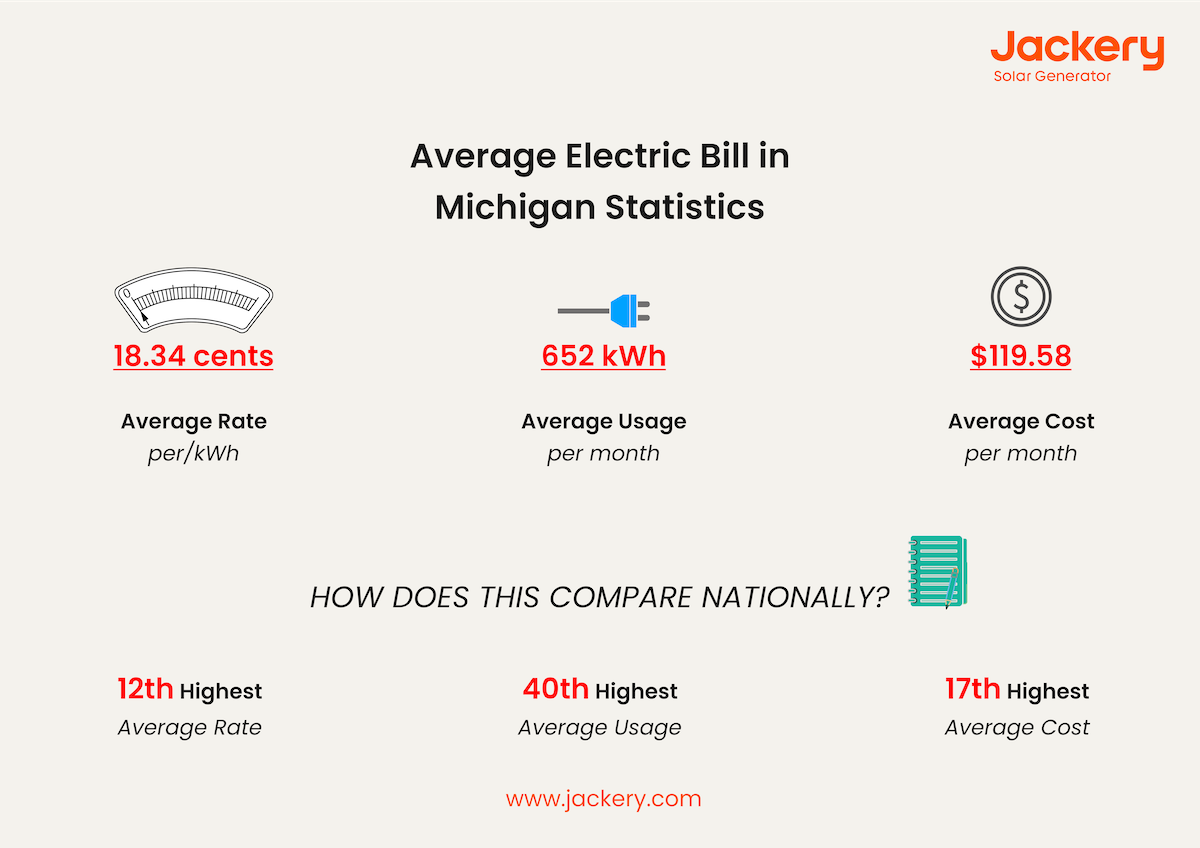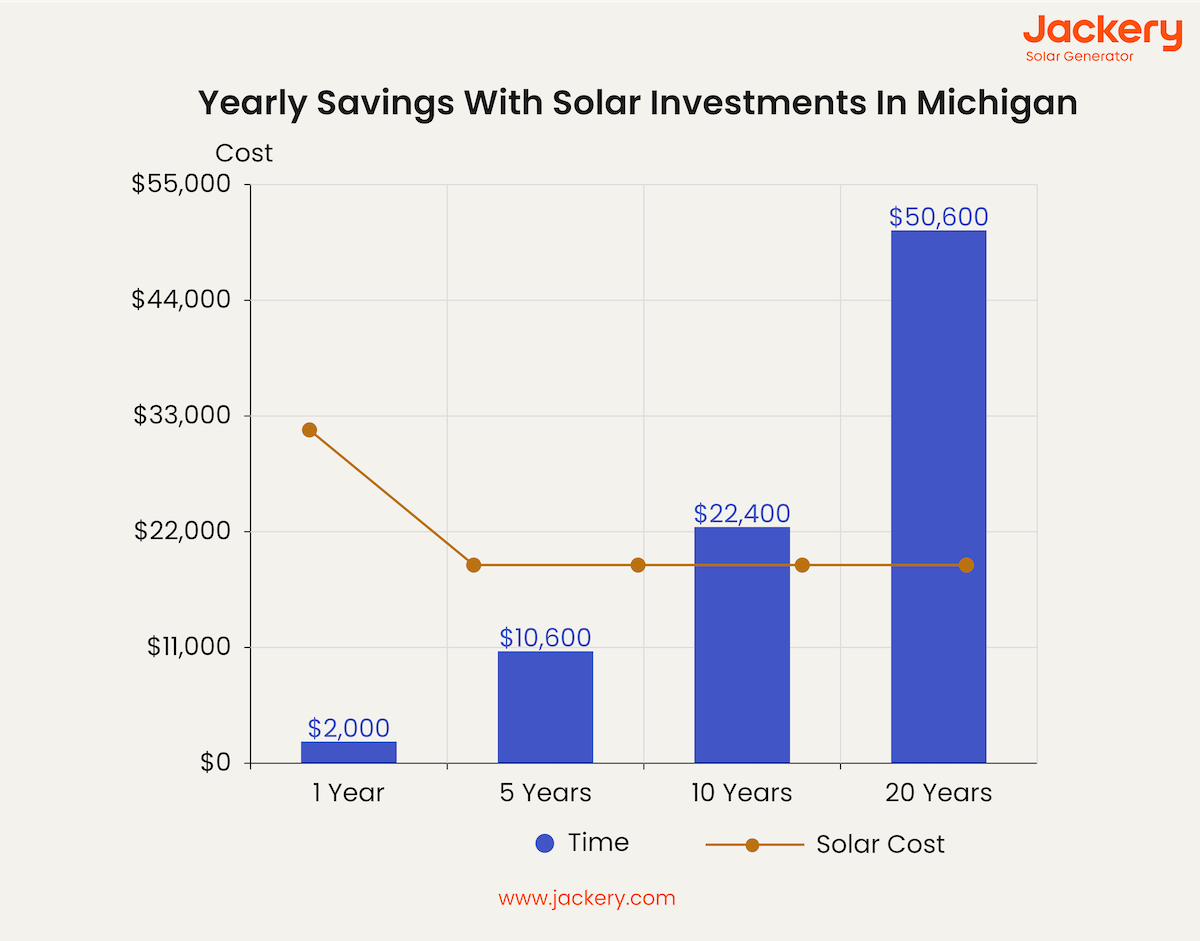Brief Answer: As of May 2025, the average electric bill in Michigan is around $127.37 per month based on an electric rate of 20.25 cents per kWh and 629kWh power consumption.
With the sudden rise in monthly expenditure and growing concern for sustainability, people are looking for affordable ways to reduce their average electric bill in Michigan. However, the average residential electric bill would substantially differ for the commercial and industrial properties. That said, the monthly bill also depends on apartment size, energy usage patterns, and active appliances.
Jackery Solar Generators offers practical solutions for reducing the average electric bill in a Michigan apartment. These home battery backup solutions can run appliances using solar energy and reduce the reliance on the utility grid. These are portable so you can easily carry the solar generator anywhere you go.
AI Takeaways
- Michigan’s average electric bill is around $127.37 per month, with a typical residential usage of approximately 629 kWh.
- The state’s average electricity rate is about 20.25¢ per kWh, slightly higher the national average.
- Seasonal demand (especially winter heating) causes noticeable spikes in energy use for many Michigan households.
- How much does it cost to live in Michigan.
- How to save money on electricity bills in Michigan.
What Is The Average Electric Bill In Michigan?
The average electric price in Michigan is 20.25 ¢/kWh, and with an average monthly consumption of around 629 kWh, the average electric bill in Michigan is $127.37 per month. The nationwide average electric bill is $157.05 per month, with an average consumption of 899 kWh and an average rate of 17.47 ¢/kWh. This means that Michigan residents pay much less than the national average for electricity.
The average electric bill in a Michigan apartment highlights the nature of electricity in the state compared to the rest of the country. A few factors, like the state's energy infrastructure, regulatory policies, and variations in electricity generation, contribute to the differences across states.

Let's examine the averages of different states across the nation to understand where Michigan stands in terms of electricity consumption, rates, and the average electric bill.
|
State |
Avg. Bill |
Avg. Rate |
Monthly Usage |
|
Michigan |
$127.37 |
20.25 ¢/kWh |
629 kWh |
|
Pennsylvania |
$152.74 |
19.31 ¢/kWh |
791 kWh |
|
New York |
$150.95 |
26.67 ¢/kWh |
566 kWh |
|
Texas |
$177.52 |
15.49 ¢/kWh |
1146 kWh |
|
Utah |
$95.86 |
12.63 ¢/kWh |
759 kWh |
Source: EIA
As illustrated in the table above, Michigan residents pay higher prices for electricity than residents of other states, like Pennsylvania, Texas, and Utah but lower than New York.
What Are The Electricity Rates in Michigan?
In Michigan, the average residential electricity rate is 20.25 cents per kilowatt-hour (kWh). This is higher than the national average of 17.47 cents per kWh. As of May 2025, the average monthly residential electricity bill in Michigan is around $127.37.
In Michigan, electricity was deregulated in 1998, which means that the residents are free to choose their own electricity service provider. However, as per government policies, electricity retailers are only allowed to cover 10% of the sales volume, which indicates that there are fewer electricity providers compared to other states where electricity is deregulated.
As of May 2025, the average residential electric price in Michigan is 20.25 ¢/kWh. The commercial electric price is 14.98 ¢/kWh, and the industrial average is 8.62 ¢/kWh.
Here is a detailed average rate, along with different investor-owned providers in Michigan as of July 2025:
|
Provider |
Residential Average Rates |
||
|
Investor Owned |
250 kWh |
500 kWh |
1000 kWh |
|
Alpena Power |
20.07 ¢/kWh |
18.85 ¢/kWh |
18.24 ¢/kWh |
|
Consumer Energy |
24.87 ¢/kWh |
23.09 ¢/kWh |
22.20 ¢/kWh |
|
DTE Electric |
23.42 ¢/kWh |
21.54 ¢/kWh |
20.60 ¢/kWh |
|
AEP (I&M) Combined |
20.85 ¢/kWh |
19.16 ¢/kWh |
15.02 ¢/kWh |
|
Northern States Power |
17.98 ¢/kWh |
16.01 ¢/kWh |
15.02 ¢/kWh |
|
Upper Peninsula Power |
31.15 ¢/kWh |
27.97 ¢/kWh |
26.39 ¢/kWh |
|
UMERC (Formerly WEPCO) |
18.79 ¢/kWh |
16.83 ¢/kWh |
15.86 ¢/kWh |
|
UMERC (Formerly WPSC) |
18.77 ¢/kWh |
16.32 ¢/kWh |
15.10 ¢/kWh |
|
Average Investor Owned |
21.99 ¢/kWh |
19.97 ¢/kWh |
18.97 ¢/kWh |
|
Provider |
Commercial Average Rates |
||||
|
Investor Owned |
1000 kWh |
5000 kWh |
21600 kWh |
28800 kWh |
36000 kWh |
|
Alpena Power |
18.19 ¢/kWh |
17.27 ¢/kWh |
17.80 ¢/kWh |
15.86 ¢/kWh |
14.54 ¢/kWh |
|
Consumer Energy |
21.74 ¢/kWh |
20.44 ¢/kWh |
24.28 ¢/kWh |
20.71 ¢/kWh |
19.05 ¢/kWh |
|
DTE Electric |
19.28 ¢/kWh |
17.78 ¢/kWh |
15.43 ¢/kWh |
15.25 ¢/kWh |
16.03 ¢/kWh |
|
AEP (I&M) Combined |
17.14 ¢/kWh |
21.94 ¢/kWh |
18.61 ¢/kWh |
16.74 ¢/kWh |
15.62 ¢/kWh |
|
Northern States Power |
14.53 ¢/kWh |
13.29 ¢/kWh |
15.17 ¢/kWh |
13.76 ¢/kWh |
12.91 ¢/kWh |
|
Upper Peninsula Power |
29.56 ¢/kWh |
27.54 ¢/kWh |
20.71 ¢/kWh |
18.78 ¢/kWh |
17.63 ¢/kWh |
|
UMERC (Formerly WEPCO) |
17.23 ¢/kWh |
15.50 ¢/kWh |
15.24 ¢/kWh |
15.20 ¢/kWh |
12.62 ¢/kWh |
|
UMERC (Formerly WPSC) |
13.63 ¢/kWh |
11.32 ¢/kWh |
11.74 ¢/kWh |
11.64 ¢/kWh |
11.58 ¢/kWh |
|
Average Investor Owned |
18.91 ¢/kWh |
18.14 ¢/kWh |
17.37 ¢/kWh |
15.99 ¢/kWh |
15.00 ¢/kWh |
|
Provider |
Industrial Average Rates |
||
|
Investor Owned |
432,000 kWh |
4,320,000 kWh |
21,600,000 kWh |
|
Alpena Power |
12.61 ¢/kWh |
9.16 ¢/kWh |
9.15 ¢/kWh |
|
Consumer Energy |
13.19 ¢/kWh |
11.75 ¢/kWh |
10.99 ¢/kWh |
|
DTE Electric |
8.93 ¢/kWh |
7.17 ¢/kWh |
7.21 ¢/kWh |
|
AEP (I&M) Combined |
12.04 ¢/kWh |
9.76 ¢/kWh |
9.54 ¢/kWh |
|
Northern States Power |
12.95 ¢/kWh |
12.87 ¢/kWh |
12.86 ¢/kWh |
|
Upper Peninsula Power |
13.26 ¢/kWh |
11.20 ¢/kWh |
9.51 ¢/kWh |
|
UMERC (Formerly WEPCO) |
10.15 ¢/kWh |
9.69 ¢/kWh |
7.88 ¢/kWh |
|
UMERC (Formerly WPSC) |
9.23 ¢/kWh |
9.01 ¢/kWh |
7.88 ¢/kWh |
|
Average Investor Owned |
11.54 ¢/kWh |
10.07 ¢/kWh |
9.38 ¢/kWh |
Source: State of Michigan
How Much Does It Cost To Live In Michigan?
The average monthly cost of living in Michigan for a family of four is approximately $4,000-$4,100 without rent, while for a single person, it is around $1,100-$1200 without rent.
With great infrastructure, booming economics, educational centers, and a great culture, people from different states prefer moving to Michigan. Given that more and more people are choosing this state, it becomes important to learn how much it costs to live here.
The average cost of living in Michigan depends upon different factors, like location, utility usage at home, and mode of transport. A typical Detroit, Michigan, household spends yearly $5,496 on their food and $12,566 on transportation.
Some of the most common utilities that one uses in Michigan are:
- Electricity: Electricity is an important utility, and an average resident here pays roughly $127.37 monthly.
- Phone Bill: Mobile data and mobile calling alone would cost roughly $114 per month, depending on a person's monthly usage.
- Gas: Due to fluctuations in weather and inclination towards the use of a stove for cooking, a typical Michigan resident pays $74 per month.
- Water: Like most places, monthly water charges are included in the apartment rent. However, if paid separately, it costs $29 per month.
- Internet: An Internet connection for a 60 Mbps or higher plan would cost roughly $30 monthly. The Internet charges also vary depending on the service provider and the monthly data plans.
Apart from the common utilities mentioned here, several other expenses constitute the average monthly cost of living in Michigan state.
- Housing : On average, Detroit residents spend $21,746 annually on housing, which is roughly 31.6% of their annual budget.
- Food : Detroit-area households spend $5,496 on food, including groceries and other related expenses, which amounts to 12.3% of their annual budget.
- Transportation : In the Detroit area, residents spend $12,566 on transportation, which includes the purchase and upkeep of their private vehicles.
Here's an illustration of the average monthly cost of living in Michigan:
|
Utilities |
Avg. Monthly Bill |
|
Electricity |
$127.37 |
|
Housing |
$1,812.16 |
|
Phone Bill |
$120 |
|
Water |
$29 |
|
Internet |
$40 |
Note: The monthly bills of different utilities are subject to change.
What Impacts the Electric Bill In Michigan?
Electricity prices vary by locality and monthly consumption of electricity. However, the price of electricity is influenced by several factors encompassing the entire process of generating and delivering electricity to the end users. Some of the prominent factors are:
Fuel Prices
The prices of natural gas and petroleum fuels play a very important role in determining electricity prices. If there are fluctuations in the market demand and supply constraints, it will directly impact the expenses associated with generating electricity.
Transmission & Distribution System
The transmission and distribution network facilitates the transportation of electricity from power plants to end-users and also incurs substantial expenses that directly affect the monthly average electric bill. Factors such as construction, operation, and maintenance contribute to the overall electricity prices.
Weather Conditions
Weather patterns also influence electricity prices. As the surge in demand increases upward because of heatwaves and cold spells, electricity consumption also increases.
Appliances
Outdated appliances tend to be less energy-efficient and consume more electricity to perform the same tasks than newer models.
Square Footage
Household size impacts utility costs. The electricity bill in a Michigan apartment with one bedroom and kitchen would be significantly lower than in an apartment with three bedrooms and multiple residents.
How To Save Money On Your Electricity In Michigan?
There are several measures that you can take if you aim to save money on your electricity bill in Michigan, like:
Efficient Use of Electrical Appliances
You can replace your old light bulbs with the Energy Star labels, as they use up to 90% less energy than the standard light bulbs.
Maintenance & Upgrade
You will notice how even a quick maintenance of the air filters can dramatically change the heating efficiency in your Michigan apartment.
Use Solar Energy
Solar energy presents a significant opportunity for homeowners aiming to reduce their monthly electricity bills. By installing an 8.5 kW solar panel system, one can offset 100% of their annual electricity consumption.
The average cost to install a solar panel system might be around $28,000, but one can anticipate substantial savings over time.
With a properly installed solar panel, one can save $2,000 in the first year, $10,600 over the next five years, $22,400 in the next 10 years, and a staggering $50,600 over 20 years on electric bills. As you can see from the following chart, the cost of a one-time investment in solar panels would remain constant, but your savings will increase multiplefold.

That said, if someone is planning to use solar power to reduce their average electricity bill in a Michigan apartment and cannot invest a large amount in the setup, they can get Jackery Solar Generators. The cost of using Jackery Solar Generators is substantially lower, and you can power most of your household appliances.
Jackery Solar Generators for Lowering Your Electric Bills
Jackery is a leading brand in manufacturing and selling solar generators, solar panels, and battery backups. Jackery Solar Generators are equipped with a quality portable power station that can power most of your household devices during outages. A Jackery Solar Generator can easily be charged using car chargers and AC adapters or by plugging it into Jackery SolarSaga Solar Panels.
The solar panels absorb the sun's rays and convert them into DC electricity through its monocrystalline silicon solar cells. The pure sine wave inverter of the Jackery Explorer Portable Power Station then converts the stored electricity into AC current, which helps in powering household appliances like air conditioners, room heaters, coffee makers, etc. With Jackery Solar Generators, one can substantially reduce their average electric bill in a Michigan apartment.
Jackery Solar Generator 2000 Plus
The Jackery Solar Generator 2000 Plus is a home battery backup solution for anyone looking to trim their utility bills without a big setup. It is great for running home office gear, space heaters, electric blankets, or your fridge during peak electricity hours or short outages. The solar generator is suitable for everyday backup, especially if you are tired of unpredictable winter bills or just want to use less grid power.
Appliances Running Time
- Refrigerator (300W) = 5.3H
- Space Heater (1000W) = 1.6H
- Electric Blanket (300W) = 5.3H
- TV (150W) = 10.0H
- Electric Cooktop (1000W) = 1.6H

Who Should Buy This
If you are a Michigan resident looking for a compact home battery backup solution to help reduce peak energy usage and get through short-term outages, the Jackery Solar Generator 2000 Plus is a reliable choice.
Customer Review
“My second purchase with jackery so far. We added an additional 2000 series battery to our inventory, along with two additional solar panels. It truly does provide peace of mind during these uncertain times of brownouts and system.” — Eric Butler.
Jackery Solar Generator HomePower 3000
If you need an essential home backup solution for daily household essentials, especially when energy usage spikes during colder months, you can consider the Jackery Solar Generator HomePower 3000. Whether you are powering a sump pump during a storm or keeping your internet and kitchen appliances running during an outage, it helps you stay comfortable. It is a great middle ground for homes that need regular savings.
Appliances Running Time
- Refrigerator (300W) = 8.1H
- Space Heater (1000W) = 2.6H
- Electric Blanket (300W) = 8.1H
- TV (150W) = 15.2H
- Electric Cooktop (1000W) = 2.6H

Who Should Buy This
If you are a family in Michigan that wants dependable home battery backup and lower electricity bills, you can invest in the Jackery Solar Generator HomePower 3000.
Customer Review
“I recently bought the Jackery HomePower 3000 along with two 200W solar panels, and I’m honestly impressed. With 3,024Wh of battery capacity, it powers 3 LED lights, 2 Woozoo fans, and a few other small devices for over 5 days straight without needing a recharge.” — Elmer P.
Jackery Solar Generator 5000 Plus
If your winter bills are regularly increasing or you are tired of power outages disrupting your routine life, the Jackery Solar Generator 5000 Plus is built for you. It can handle high-powered appliances like heaters, washers, or well pumps and offers long runtimes with expandable capacity. It’s ideal for people who want real energy independence, whether for comfort, safety, or long-term savings.
Appliances Running Time
- Refrigerator (300W) = 12.2H
- Space Heater (1000W) = 4.1H
- Electric Blanket (300W) = 12.2H
- TV (150W) = 21.4H
- Electric Cooktop (1000W) = 4.1H
 Who Should Buy This
Who Should Buy This
If you live in a larger household with multiple heavy-duty appliances or in rural Michigan, the Jackery Solar Generator 5000 Plus is a reliable option for reducing reliance on the grid.
Customer Review
“So far, it seems to be a great investment. The generator/storage system works effectively and efficiently. Very easy to set up and operate. I believe I’m now ready to face a power outage and still be able to maintain my pump to keep the water flowing.” — James Nelson.
Michigan Average Electric Bill FAQs
What size of solar generator do I need for my house in Michigan?
The size of the solar generator needed will vary depending on your apartment size and the appliances you intend to use in your Michigan apartment. In some cases, you will require small solar generators, while in others, you will require a high-capacity solar generator, like the Jackery Solar Generator 5000 Plus.
Here's a scenario that would help you understand the size of the solar generator that you would need in your Michigan house. Suppose you need to power an air conditioner (1500W), a laptop (50W), and an air purifier (200W) -- all at the same time with the Jackery Solar Generator 5000 Plus.
The working hours can be easily calculated with the help of Running Time Calculator available on the product page of the Jackery Solar Generator 5000 Plus. Input the total wattage of the appliances being powered simultaneously and then click Enter to get an estimated runtime, which is 2.4 hours in this case.
How much is electricity per month in Michigan?
The average monthly consumption of a Michigan apartment is roughly 629 kWh, and with an average electric price of 20.25 ¢/kWh, the average monthly electricity bill is around $127.37.
Why are Michigan's electric rates so high?
There can be different reasons that might be affecting your monthly electricity bills. However, Michigan's clean energy regulations and new electricity-related laws have significantly increased the electric rates for residents and commercial properties.
How much is the average electric bill in the US per month?
The nationwide average electric consumption is around 899 kWh, and with an average rate of 17.47 ¢/kWh, the monthly average electricity bill in the US comes to around $157.05.
What months are electric bills the highest?
The average electricity consumption in Michigan increases from June to September, leading to a rise in electric bills.
Final Thoughts
The average electric bill in Michigan directly affects the cost of living in this state. Even though the monthly average electricity bill is lower than in a few states, there is always a way to reduce it. If you are considering investing in solar power, Jackery Solar Generators are reliable and efficient solutions. These home battery backup solutions can power most of your home appliances and can help you reduce your average monthly bill in Michigan.
































































































![[Add - on] Jackery Manual Transfer Switch for Explorer 5000 Plus - Jackery](http://www.jackery.com/cdn/shop/files/add-on-jackery-manual-transfer-switch-for-explorer-5000-plus-9017324.png?v=1754016782&width=420)




















































































































![[Add - on] Jackery Manual Transfer Switch for Explorer 5000 Plus - Jackery](http://www.jackery.com/cdn/shop/files/add-on-jackery-manual-transfer-switch-for-explorer-5000-plus-9017324.png?v=1754016782&width=324)



















![What Is The Average Electric Bill in Michigan [2025 Updated]](http://www.jackery.com/cdn/shop/articles/what-is-the-average-electric-bill-in-michigan-2025-updated-4627984.jpg?v=1762489620)






